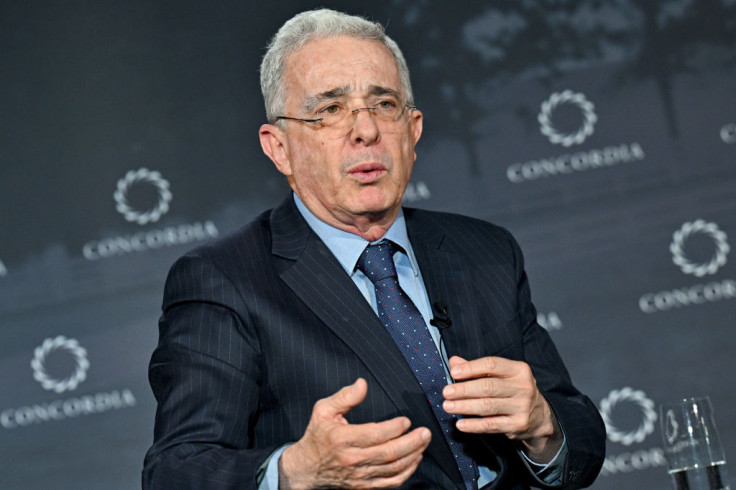
Álvaro Uribe, Colombian between 2002 and 2010, became the country's first leader to face a criminal conviction after a Bogotá court found him guilty of witness bribery and abuse of process last week. He was sentenced to 12 years of house arrest.
The trial has not only caused political shockwaves in Colombia but also prompted condemnation from top Republicans in Washington, many of whom are long-running allies of Uribe.
Comments from senior politicians including Secretary of State Marco Rubio have generated fears in Colombia that the U.S. will impose punitive measures, as it did last Wednesday against Brazilian officials over the trial of ex-president Jair Bolsonaro.
The charges against Uribe stem from an investigation that began in 2012, when the former president accused another Senator of libel for suggesting he was involved with the right-wing United Self-Defense Forces of Colombia (AUC) paramilitary group. The Bogotá court on Monday found Uribe had in fact attempted to persuade three ex-paramilitary combatants to change their testimonies against him during the libel investigation.
Paramilitary groups, of which the AUC was by far the largest, were responsible for killing over 200,000 people between 1985 and 2018, according to the Colombian Truth Commission.
But Uribe maintains his innocence and his legal team said it will appeal the guilty verdict.
He has support not only from prominent conservative figureheads in Colombia but also in the United States; Marco Rubio and Florida Congressman Mario Díaz-Balart, who serves as Vice Chair of the House Appropriations Committee, have long-running relationships with Uribe.
After Judge Sandra Heredia Aranda delivered her guilty verdict on Monday, they both came to the former president's defense.
"Former Colombian President Uribe's only crime has been to tirelessly fight and defend his homeland. The weaponization of Colombia's judicial branch by radical judges has now set a worrisome precedent," wrote Rubio in a post on X.
Mario Díaz-Balart described the trial as a "witch hunt" and condemned "the growing influence of far-left forces aligned with" Colombian president Gustavo Petro.
Other Republican politicians also chimed in: "Colombia gets one step closer to illegitimacy. We've seen this movie before in Venezuela," wrote Ohio Senator Bernie Moreno.
The chorus of criticism from Washington has caused alarm in Colombia.
"With how the Trump administration and how hardline Republicans are treating this case, it's to be expected that there will be some ramifications from Washington," said Sergio Guzmán, Director at Colombia Risk Analysis, a political risk consultancy.
Punitive measures are already on the table, with the Appropriations Committee proposing 50% cuts to non-military aid for Colombia in its 2026 budget.
The body cited in a report a slew of factors in its decision, including impotent counter-narcotics programs and alleged drug use by senior members of government. But it also said the Uribe case was a key factor.
"The Committee is concerned by reports of due process violations and judicial irregularities in the case," read the report drafted by the Republican-controlled committee.
"Questions of politicization raise serious concerns about the deterioration of judicial independence and the rule of law in Colombia," it continued.
If approved, the 50% aid cuts would deal a blow to a country that already lost 70% of all humanitarian funding when USAID shut its doors earlier this year.
But there are fears in Colombia that the repercussions may go further, mirroring the White House's intervention in Brazil's judiciary last week. Washington imposed an additional 40% tariff and a slew of financial sanctions on the country on Wednesday over its trial of Jair Bolsonaro, a close Trump ally, for plotting a coup.
The U.S. sanctioned the judge heading the investigation, Supreme Court Justice Alexandre de Moraes, claiming "serious human rights abuses."
"Let this be a warning to those who would trample on the fundamental rights of their countrymen—judicial robes cannot protect you," wrote Marco Rubio in an X post on Wednesday.
The post has been interpreted by some as a warning to Colombia's judiciary over the Uribe verdict.
President Petro responded to Rubio's tweet by saying the sanctions "break the American Convention on Human Rights," which Colombia, Brazil and the United States are signatories of.
Days earlier, he wrote: "I ask the U.S. Embassy in Colombia not to interfere in my country's justice system."
Washington's final response will become clear in the coming weeks.
© 2025 Latin Times. All rights reserved. Do not reproduce without permission.




